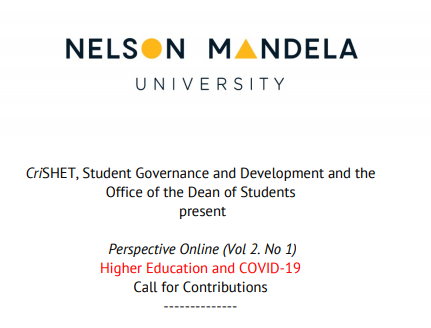
What is the journal about?
The Chair for Critical Studies in Higher Education Transformation (CriSHET) in partnership with the Office of the Dean of Students, and the Department of Student Governance and Development at Nelson Mandela University have a running student bi-annual student journal that features articles, columns, and creative work by students on the deepening of transformation, decolonisation, and the Africanisation of higher education. This issue will be the third edition and will focus on Higher Education and COVID-19.
What does the journal want to achieve?
The inaugural edition of the journal was launched on 29 March 2019 and is available on the CriSHET website (crishet.mandela.ac.za). The premise of the journal is that deep change in universities is a collective project that is driven by social activism and thoughtful and productive contributions to advance academic, pedagogical and knowledge renewal within the university. The journal seeks to develop a culture of disciplined writing to bring to the fore a particular social consciousness amongst university students underpinned by robust engagement, radical contestation of ideas and critical scholarship.
On what platform will the journal be published?
The journal will be made available online in all communication and media platforms with a limited number of hard copies. Writers who also intend to develop their columns into research studies and/or journal articles are encouraged to utilise this platform.
Who should contribute and how should they write?
Undergraduate and post graduate students across all faculties are encouraged to write as individuals and/or groups. A quarter of the journal space will be set aside for the contributions of staff and community members. Contributions must be thoughtful, considered and analytical and meet the general criteria of conversational writing.
Higher Education and COVID-19 Themes
The COVID-19 pandemic has significantly affected the higher education sector across the globe. Various institutions have been compelled to discontinue their campus-based activities of mainly teaching, learning, and research. These have since switched to online platforms where online applications such as Zoom and Microsoft Teams have been utilised to allow for the continued functioning of universities. In addition, the student affairs divisions of universities and the administrative arm of their functions have also been affected – with some student formations calling for scrapping or reconfiguration of tuition fees in light of the students’ socio-academic disconnect from the conveniences that come with being enrolled in a residential university.
In the South African context, the higher education sector is confronted with the COVID-19 pandemic within a post-FeesMustFall framework that underscored the high levels of inequality that its society is faced with. Students across South Africa’s higher education sector have continuously waged nationwide protests for free decolonised education, for the ending of labour outsourcing, and against gendered and racialised patterns of dehumanisation that are expressed in university practices, experiences, policies, and various curriculum contents.
The COVID-19 pandemic has accelerated these challenges as the ‘lockdown’ regulations have exacerbated exclusionary disadvantages for underprivileged students, as their home backgrounds are largely inconducive to fulfilling experiences of online learning. At an institutional level, the pandemic has emphasised the existing poor levels of socioeconomic underdevelopment in the majority of communities from where students come from. They frequently lack basic sanitation, electricity, digital connectivity infrastructure, and decent housing – the required resources for maintaining distance learning. Furthermore, the inequalities between public universities themselves have been greatly exacerbated by the pandemic, as former white urban-based universities continue with their operational systems, while black rural universities have been handicapped.
In this regard, the overall direction that the higher education sector seems to be taking in surfacing its ‘post-COVID-19 pandemic’ regime is towards hastening the rollout of the necessary technology needed by all students and staff to revolutionalise universities. Some students have proven comfortable adapting to online learning as a social media savvy generation that already has a significant foothold in digitalisation. In addition, university systems such as institutional meetings, seminars, classes, and innovative strategies have proven to be workable under the current technological climate. Yet, various academics have expressed concerns about the absence of valuable aspects of learning and pedagogy that human contact provides, and some higher education practitioners have stated that university campus life is key to the social literacy required for adolescences to transition into adulthood.
Therefore, for this edition, we invite articles, columns, and creative work underpinned with social justice orientation that can contribute to the transformation, decolonisation, and Africanisation of Higher Education and the broader society within a global context that is engulfed by pandemics such as COVID-19. We call upon authors to focus on one or more of the following themes:
• Online teaching, research, learning, and community engagement practices
• Language, pedagogical experiences, and intersectional discriminations
• Urbanisation, connectivity, university communities, student economies, and student life
• Government architectures, parliamentary oversight, public administration alternatives, community policing, and public service
• Tuition, legal architectures, university labour, and higher education’s political economy
African feminism(s), social vulnerabilities, queer experiences, and gendered inequalities
• Internationalisation, market forces, epistemic injustices, coloniality, sociological violence, and ideologies
• Access, success, governance, the state, funding, digitalisation, and transformation
• Decolonisation, Africanisation, student activism, curriculum transformation, and transdisciplinary possibilities
• Student experiences, mental health, staff wellbeing, collaborations, community outreach, COVID-19 higher education management systems, university health community interface, and civic leadership
• Community solidarities, rural experiences, township economies, food security, and household sustainability
Timeline
Please submit the following to Pedro.Mzileni@mandela.ac.za by Friday, 21 August 2020
• Paper Title
• Abstract (250 words)
• Author bio (50 words)
The abstracts will be tabled to a peer-review panel for publication consideration.
Feedback on abstracts received will be sent to contributors on Friday, 28 August 2020.
Successful contributors will be required to attend an online writing workshop on Friday, 4 September 2020.
Full articles of no more than 2000 words (including list of references) will be submitted to the Editor, on the email stated above.
Deadline for the submission of full articles: Monday, 14 September 2020.
The journal will be published on Wednesday, 30 September 2020.